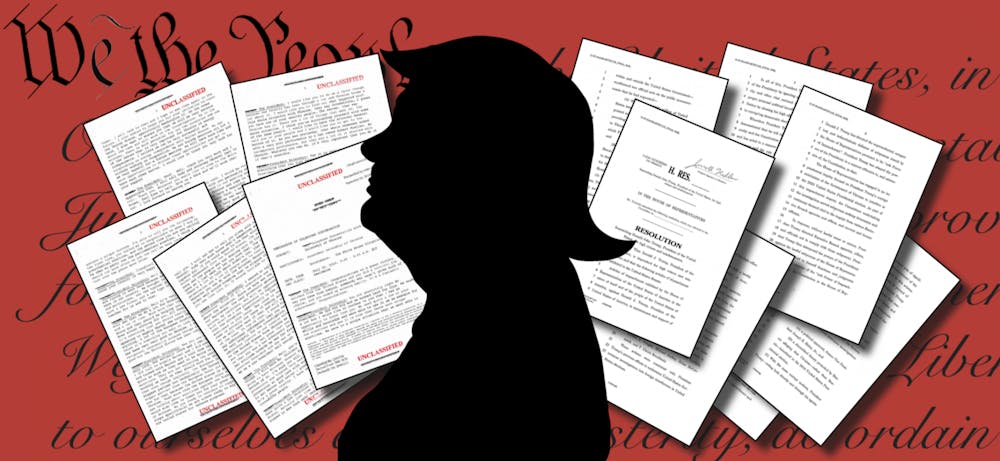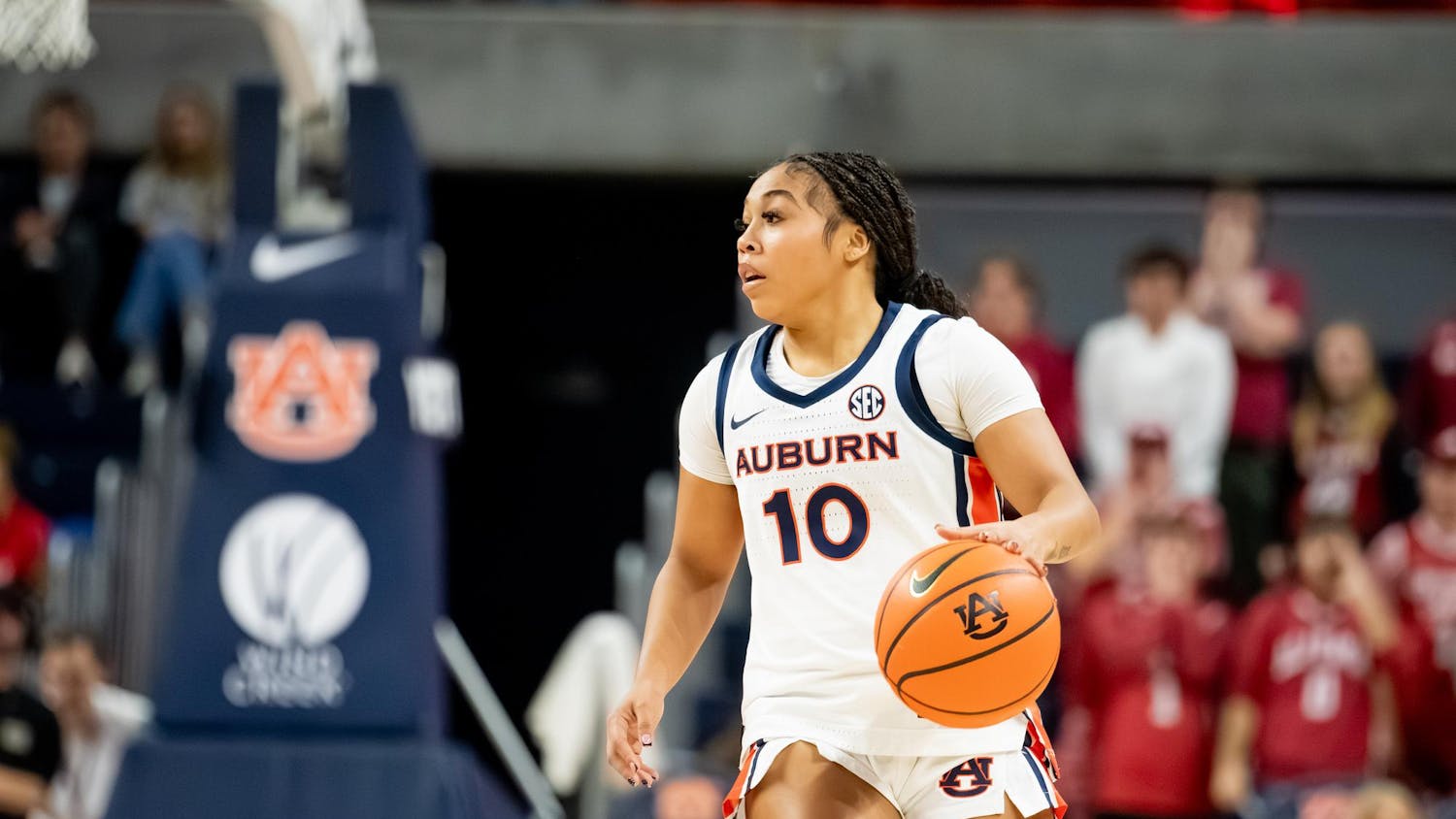The impeachment trial of President Donald Trump has barely begun, but the political drama inherent in such a process is already drawing the eyes of those on the Plains who either see a man guilty of abuse of power or a leader being falsely accused of betraying his oath of office.
The trial, still in early stages, is only the third of its kind in the history of the United States, as Trump now joins the ranks of Presidents Andrew Johnson and Bill Clinton — both of whom were acquitted in their respective Senate hearings.
Trump’s impeachment, however, is gripping the attention of many Auburn students who reflect raging partisan divisions that will be tested in November.
For some students, the impeachment process was flawed from the moment the first charges were pronounced. Max Kleiber, a junior in political science and communications director for Auburn College Republicans, said some of the actions taken by the House of Representatives haven’t made much sense, including the charges placed on Trump.
“When you look at the charges, they are very interesting by nature,” he said. “The first charge is obstruction of Congress, which is just a check and balance on the Constitution. President Trump is his own branch, he can’t necessarily obstruct Congress. That’s what he’s supposed to do by Constitutional design.”
Aahil Makhani, vice president of Auburn College Democrats, said he believed the House Democrats fairly charged Trump on impeachable offenses.
“House Democrats looked at all of the evidence that had been presented at that point in time and found that, like most Americans think, President Trump had, indeed, committed impeachable offenses and that he deserves to be impeached,” Makhani said. “I do find it disheartening that most Republicans chose not to support the action and looked for ways to protect President Trump and the GOP as a whole, rather than uphold the rule of law in order to protect our nation.”
The second charge on Trump was abuse of power, which Kleiber said was unjustified.
“Abuse of power is not really a crime,” he said. “They wanted to go with bribery, and then they took away intent, which is a pretty large part of it. You couldn’t prove the intent, so they wanted to impeach Trump before the 2020 election instead of just waiting a few months for [U.N.]Ambassador [John] Bolton to testify or the election to happen and the Democrats win, which they said will happen.”
After the House voted to impeach Trump, House Speaker Nancy Pelosi chose to hold on to the articles of impeachment for about a month before sending them to the Senate. While many Republicans were frustrated by
this action, Pelosi was within her rights to do so, Kleiber said.
“You want to complain because it’s kind of annoying when there is supposed to be a bicameral action; the House and the Senate are supposed to do something together, and one of them doesn’t pass along the baton,” Kleiber said. “She did have full legal authority to do what she did. It doesn’t say that the speaker of the house has to send the articles over within a certain amount of days.”
Makhani said Pelosi’s action was completely justifiable.
“She wanted to make sure the Senate would give the President a fair trial, rather than the speedy acquittal he’s gunning for,” he said. “More than 70% of Americans agree that witnesses need to testify, but Senate Republicans voted to block a subpoena that would bring forward witnesses and documents that would ensure the trial against the President is fair and accurate.”
Democrats, Republicans and members of Trump’s legal team stood on the Senate floor on Jan. 21, the first day of deliberations to set standards for the trial, and Kleiber, who was keeping up with the trial throughout the day, said the party lines were extremely visible. But it’s understandable, he said, given the political climate and the 2020 election approaching.
“From what I understand, things are breaking down on party lines, which isn’t really surprising,” he said. “You do what your party wants you to do, especially when politics are so divided.”
Ryan Williamson, an assistant professor in the department of political science at Auburn, said the fact that this impeachment process is reflecting the current polarization in the U.S. is expected because impeachment is dependent on how it was previously carried out, and there aren’t many examples to pull from.
“If impeachment is never used, if it’s never employed, then you could say the bar is too high, and it’s effectively a useless tool,” Williamson said. “But if you constantly dismiss every charge, then it’s no longer an effective tool.”
But Williamson maintained that the process as of now is still a politically seismic one.
“Regardless of what happens, it’s already a significant, historical event,” Williamson said. “It’s such a rare phenomenon with a lot of gravity, so it’s noteworthy, and this is something that will continue to be talked about for as long as our country exists.”
And students know the weight this event will carry looking back, Williamson said.
“Even to students here that are just becoming politically aware or active, it’s so apparent that this is a monumental time,” Williamson said.
The historical event began when Senate Majority Leader Mitch McConnell said he’d ensure the trial would run smoothly and in a manner that would expedite the process for the sake of the American people. Senate Minority Leader Chuck Schumer, however, began by declaring that the eyes of history are watching the Senate, seeing if it would commit to its constitutional responsibility.
Kleiber said he believes the American public will appreciate McConnell’s steadfast approach.
“Personally, I’d like to see this finish up as soon as possible,” Kleiber said. “I’m a policy person, and this is a bit dramatic, very petty of what each side does to one another. I think America is tired of this, so I think Mitch McConnell is doing us a favor.”
Members of the Democratic party don’t necessarily see what McConnell is doing as effective, Makhani said, adding that it may, in fact, be hurting the integrity of the legal system.
“I think Senator McConnell’s statements ignore the truth of a trial, in that in order for a trial to be fair and accurate, all evidence must be taken into consideration,” Makhani said. “Calling out Democrats for ensuring that all the facts and witness testimony are taken into account is frankly the latest in a long line of partisan jabs and attempts to consolidate power.”
Paul Harris, chair of the department of political science, said listening to students’ different opinions on this issue speaks to the intense interest and attention the case holds.
“It’s drama — national political drama that plays out on Capitol Hill,” Harris said. “The trial has a foregone conclusion. Unless something completely unexpected happens, Trump is going to be acquitted, and, knowing that, the whole process becomes even more politically driven. That’s when the drama of it all begins to kick in.”
Harris compared it to when Auburn plays a homecoming game against an unranked, smaller school. People will watch, fans will support their side. But everyone knows Auburn will come out on top. It’s almost inevitable. The same goes for Trump, Harris said.
“If the Senate were controlled by Democrats, the stakes would be a lot higher,” Harris said. “But right now, Trump is fine.”
But the interest is still there, and Williamson said he added a whole section about impeachment in a government class last semester because students kept referring to it.
“We’re living in a time with intense polarization and in an era of negative partisanship,” Williamson said. “People don’t necessarily say they like their own side. They just hate the other party.”
Do you like this story? The Plainsman doesn't accept money from tuition or student fees, and we don't charge a subscription fee. But you can donate to support The Plainsman.

Eduardo Medina, senior in journalism, is the editor-in-chief of The Auburn Plainsman.





